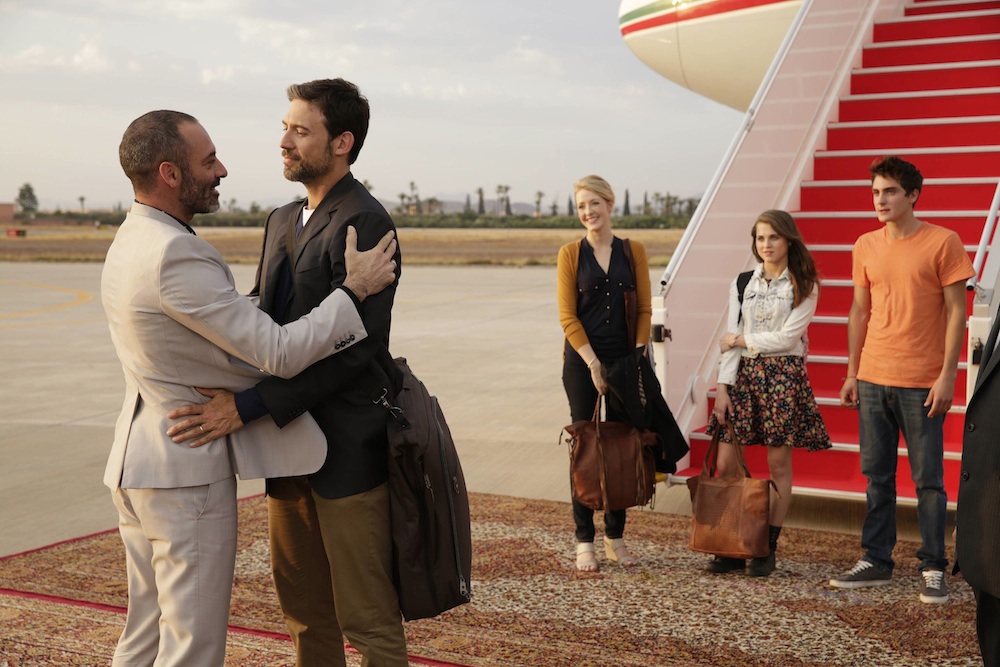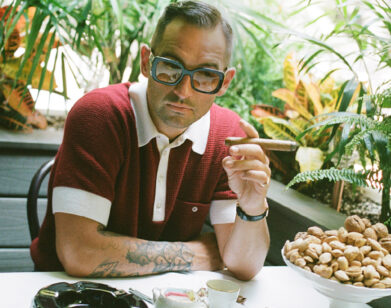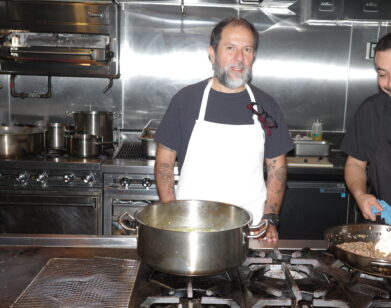Adam Rayner’s Prodigal Son

ABOVE: (LEFT TO RIGHT) ASHRAF BARHOM, ADAM RAYNER, JENNIFER FINNIGAN, ANNE WINTERS, AND NOAH SILVER IN TYRANT. PHOTO COURTESY OF FX.
Bassam Al-Fayeed, the second son of a Middle Eastern dictator, is the appropriate heir to his father’s throne in all but age. A man who realizes the value of logic and patience, Bassam is clever, calculating, independent, and understated. He tries to pretend he is uninterested in the family business; he moves to America, becomes a pediatrician, marries a nice blonde lady named Molly, and has nice American children including a son who enjoys fooling around with men and a daughter who doesn’t want to spend time in a patriarchal society.
But Bassam is a character on FX’s new Middle Eastern thriller, Tyrant, created by Homeland‘s Gideon Raff, and Bassam turning back on his family entirely is not an entertaining option. Instead, Tyrant‘s pilot begins when Bassam, known to his American friends as Barry, returns home for the first time in 20 years for his nephew’s wedding. Accompanied by his nuclear American family, Bassam is greeted by his elder brother, Jamal; his aging father, who has outlasted so many of his authoritarian peers; and his British mother.
Jamal might seem like a better leader—driving around in a red sportscar listening to Aerosmith, he goes to great lengths to project a ruthless confidence—but he is ultimately rash, shortsighted, and insecure. If Tyrant is The Godfather, Bassam is Michael Corleone and Jamal is Santino.
British actor Adam Rayner, who plays Bassam, was one of the last actors cast in the show. “I am rarely the first choice for things,” he says over the phone. “The casting was a relatively short process, but it was very late on in the whole scheme of things, which tends to be the way with me.”
EMMA BROWN: When, in your mind, did Bassam become Barry?
ADAM RAYNER: I think it was when he was 16, 17. You don’t really see it in the pilot, but the indication is he moved to America when he was quite young, possibly to finish schooling. I think, due to what he’s running away from, and maybe the prejudices that he encounters when he first gets to America, he makes a real effort to assimilate as fully and quickly as possible. That’s when Bassam becomes Barry, at quite a young age.
BROWN: In the flashbacks to when Bassam is a young boy, it seems like he is actively seeking his father’s approval—he wants to fit in at home.
RAYNER: Absolutely. [But] men react differently as they get older to failing to get the love of their father. How you react changes.
BROWN: Bassam never had the same sort of coddling as his older brother Jamal.
RAYNER: There’s very much that kind of first-born son, he’s the “rightful heir” thing going on. Jamal is given the attention and it’s quite clear from a young age that he’s the chosen son, and that must be very, very difficult for a kid to deal with. That sort of shapes who he becomes and adds think kind of sliver of steel to young Bassam’s character; he’s tempered through adversity, through not getting the attention and the love that, of course, every child craves.
BROWN: Had he been the oldest son, would Bassam be acting like Jamal?
RAYNER: I don’t think he would have become like the Jamal we see in the pilot—part of the point of the show is the difference between men, regardless of their upbringings. Here’s a guy who has something inherent in his character, which circumstance doesn’t take away even when he tries himself to change circumstances. He’s running from his true nature and that true nature would have come out had he been the first-born son. I think that’s the point of the show in a sense, that he’s different.
BROWN: Do you have brothers?
RAYNER: I do. I have an older brother myself.
BROWN: Are you very different? Are you close?
RAYNER: We’re different and close. There’s not much sibling rivalry; we’re just good mates. There’s not a great deal of similarities between Jamal and Bassam and me and my brother, other than the fact that when I was a kid, I really looked up to him and still do, to a degree. In a way, that’s very different because Barry/Bassam is Jamal’s older brother in terms of character, whereas my older brother was my older brother.
BROWN: Are any of your family members in the arts?
RAYNER: Not professionally, but my father has written a lot and my brother is very musical. They’re a pretty creative bunch, but no one’s done it for a living.
BROWN: When did you decide that you wanted to do it for a living?
RAYNER: When I was at university. I was always interested in it when I was younger, but it was when I was at university, getting together with other like-minded theatrically inclined types, that I admitted to myself that I wanted to be an actor. It’s quite a scary thing to even admit to yourself because you’re opening yourself up to a lot of people. That’s the first stage. But that’s the great thing about university, you’ve got people around you who are taking a risk and trying things out themselves. It gives you the confidence to try and take it to the next step, which was drama school. Then you do that, and you’re in the business in a sort of embryonic way. You’re in it and it’s just a matter of hoping that the jobs start coming and they get better and better and 10 years later, hopefully, you might be in a show like Tyrant. Awesome if that’s how it works out. Where are you from?
BROWN: I grew up in London, but I have a very strange accent. When I was a child, I spoke with an American accent and so did my siblings, but they were bullied at school, so now they have really English accents. I never was, so I kept a sort of American accent.
RAYNER: That’s what happened to me. My mother is American. I first went to school in America and we came back when I was about six to rural Norfolk. In primary school, I was teased immediately and mercilessly. I probably dropped that accent within about 10 days. Kids adapt pretty quickly when they need to. I certainly have a sliver of me, which is definitely American, and feels a great pull towards where I spent time when I was very young, which is in California.
BROWN: What was your first paid acting job?
RAYNER: [laughs] My first paid acting job was understudying Matt Damon in a western play about 12 years ago. It was a good first job; it was a good first gig, no doubt about it. It got even better because he left the show early to publicize the first Bourne movie, and I got to go on for a couple of weeks at the end of the show—the end of the run—which was amazing.
BROWN: So you have great sympathy for understudies.
RAYNER: Oh huge, huge. I’ve done it a couple of times, both times for major American stars. It’s actually quite good doing it for them because they have a tendency to leave, to go off and not show up for work for various reasons. [laughs] Which is both good and bad; obviously you want to be up there doing it, but you have to deal with the great sort of sigh of disappointment that the audience makes when the curtain goes up and it’s not the star they came to see but some fucking understudy they’ve never heard of. [laughs]
BROWN: Do you feel especially validated if they clap at the end?
RAYNER: As long as you don’t totally screw it up they tend to be quite kind to you—those that stay, because about half of them leave.
BROWN: Really? Half of them leave? That’s terrible.
RAYNER: Well, that’s a slight exaggeration, but there is certainly a bit of a drop off, especially if they are offering people refunds to come back when the star’s in. A lot of people take that option because that’s why they’re there, really, which you can sort of understand. Now I have a great affinity with the understudy.
BROWN: Have you always gotten to go on stage as an understudy? Have you ever been an understudy and never gotten to assume the role?
RAYNER: I got some on for [Matt Damon]. Later on, I understudied for Val Kilmer and I did that part quite a few times as well. That was the last time I did it.
BROWN: You don’t seem like an obvious substitute for Val Kilmer. I mean that in the best possible way.
RAYNER: [laughs] Well, it was a production of The Postman Always Rings Twice, and obviously there’s a famous movie where the guy’s a bit older and Jack Nicholson played him. That’s the sort of way they were going with Val, but in the actual novel, he’s younger, so you can play it both ways.
BROWN: Have you ever forgotten your lines?
RAYNER: I have once. When I wasn’t understudying Val, I had [a small] part in the show. I only had about six lines, and I managed to forget one of them on the first night that we did the play. Fortunately, the old pro that was following me stepped in and gracefully saved the situation. But that’s the irony; I’ve only forgotten lines when I’ve barely had any—when I’ve got lots of lines I tend to remember them. It’s not a pleasant experience, you feel like a right idiot.
BROWN: Is there anything you did early in your career that you would never do again?
RAYNER: Pretty much everything—in terms of jobs and acting. [laughs] I was by no means the most talented actor in the world. I’ve worked really hard and thought about what it is to be a good actor a lot over the last few years. Hopefully I know what I’m doing a little bit now. But one of the great things is that it’s something you get better and better at. Unlike other careers where you have a peak period and then you drop off, I think with acting you can keep on adding to your skills pretty much indefinitely. But yes, lots of what I was doing early on we shall not revisit shall we say.
BROWN: Is there any one role on your bucket list?
RAYNER: I would love to play Benedick from Much Ado About Nothing. I’ve been in a very good production of that and the part was played by one of my very best friends, so it would be a little bit weird to do it because I’m so familiar with this guy and his performance, an actor called Joe Millson. But it’s a wonderful part that I’d love to play. And James Bond, obviously.
TYRANT PREMIERES TONIGHT, JUNE 24, ON FX.






